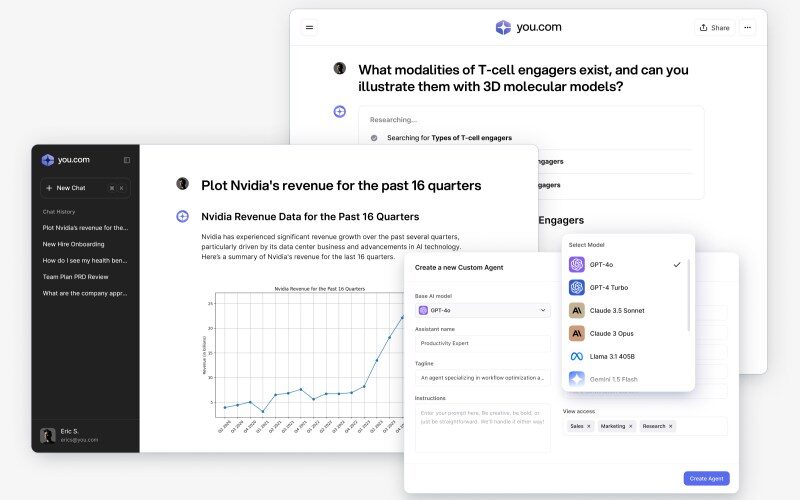Join our daily and weekly newsletters for the latest updates and exclusive content on industry-leading AI coverage. Learn More
You.com, the AI-powered search and productivity platform, announced today it has raised $50 million in Series B funding, marking a significant shift in the enterprise AI landscape. Georgian led the round, with participation from tech giants Nvidia and Salesforce Ventures, in addition to Day One Ventures, bringing You.com’s total funding to $99 million. This investment highlights the growing demand for AI solutions that can demonstrably enhance workplace productivity.
Richard Socher, former chief scientist at Salesforce and a renowned figure in natural language processing, founded You.com in 2021. The company is pioneering a new category in the AI space: “productivity engines.” These tools aim to revolutionize how knowledge workers interact with information and complete complex tasks.
“We started you.com to do more than search. We saw an opportunity to reinvent the gateway to everyone’s online journey,” Socher told VentureBeat. “We now help millions of knowledge workers be more productive, whether it’s through research and analysis, problem-solving, or content creation.”
You.com’s growth trajectory is impressive. The company reports serving over 1 billion queries since its launch and claims a staggering 500% revenue growth since January. This rapid expansion comes at a time when enterprises are grappling with “AI sprawl” — the proliferation of disparate AI tools and subscriptions across organizations.
To address this challenge, You.com offers access to multiple leading AI models through a single platform, enhanced with live web access. The company also places a strong emphasis on accuracy, a critical factor for enterprise adoption.
“It’s easy to make a quick prototype with an LLM. It’s difficult to make them accurate at scale,” Socher explained. “Our focus at you.com has been making LLMs more trustworthy. In December 2022, we were the first consumer-facing LLM with internet access, providing up-to-date answers with verifiable citations. Since then, we’ve built an entire AI operating system that’s model agnostic to provide the most comprehensive and accurate responses.”
This focus on accuracy distinguishes You.com in a market saturated with AI solutions that often prioritize speed over reliability. The company’s approach includes features like the “Research Assistant,” which provides comprehensive reports with verifiable citations, and the “Genius Assistant,” which uses Python code and chain-of-thought reasoning to solve complex problems.
You.com is also introducing “multiplayer AI” features, expanding beyond individual productivity to enable team collaboration and custom AI assistant sharing within organizations. This shift towards enterprise-focused solutions is strategic, as Mr. Socher explains:
“Where we really shine, where we provide a 10x better experience is for knowledge workers in business,” he said. “When you’re that AE who needs to get a quick brief on a company before they go into meeting — that’s when it really shines.”
The company’s move to a consumption-based pricing model represents another significant development. Mr. Socher argues this approach better aligns incentives to drive enterprise-wide AI adoption.
“Even companies that are trying to use this technology often struggle with it, and there’s low adoption in their organizations,” he said. “If you’re selling them 1000 seats and then only 20 use it, you’re still making money, right? And then you don’t have the right incentive alignment to really help that organization make the most use of the technology.”

The Future of AI in the Enterprise: Challenges and Opportunities
This strategic pivot towards enterprise solutions and consumption-based pricing could prove crucial for You.com’s long-term success. As the AI market becomes increasingly crowded, companies must differentiate themselves not just through technology, but through business models that encourage widespread adoption and demonstrate clear ROI.
The broader context of this funding round is significant. As open-source AI models like Meta’s Llama 3.1 and Mistral AI’s offerings gain traction, the differentiation for AI companies increasingly lies in their ability to create valuable applications and workflows on top of these models. You.com’s focus on accuracy, customization, and productivity aligns well with this trend, potentially giving it an edge in the enterprise market.
However, challenges remain. You.com will need to compete against well-established tech giants with deep pockets like Meta and Google and startups with existing enterprise relationships like OpenAI and Anthropic. The company must also prove that its “productivity engine” approach can deliver consistent, measurable benefits across various industries and job functions.
Looking ahead, Socher is optimistic about the potential for AI to transform knowledge work. “I think 2025 will show we’re now able to move out of the POC stage into real production workflows,” he said. “Very few jobs will be completely replaced with Gen AI, but people that use Gen AI will be 20%, 30%, 60% more productive and get stuff done. And that’s still very, very meaningful to a lot of people.”
As enterprises continue to navigate the complex landscape of AI tools and capabilities, You.com’s bet on “productivity engines” could position it as a key player in the next phase of enterprise AI adoption. The company’s success will hinge on its ability to deliver on its promises of accuracy, customization, and tangible productivity gains in real-world business environments.
“In the end, we will likely have more AI agents surfing the web than people, and that’s going to start next year,” Mr. Socher predicted. If this vision materializes, it could mark a fundamental shift in how knowledge work is performed and how businesses operate in the AI-enabled future.
As the enterprise AI market continues to evolve rapidly, You.com’s focus on productivity and accuracy positions it as a company to watch. The coming months will reveal whether its approach can truly deliver the transformative impact on knowledge work that Mr. Socher and his team envision.
Source link lol

